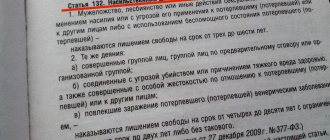Everything about criminal cases
Go to the articles of the Criminal Code in this area
Plenum of the Supreme Court of December 4, 2014 No. 16 (as amended on December 4, 2014)
“On judicial practice in cases of crimes against sexual integrity and sexual freedom of the individual”
TABLE OF CONTENTS
| Motive — clause 1 Plenum No. 16, the motive for committing these crimes does not matter VIOLENCE — clause 2 Plenum No. 16 violence can be both dangerous and non-dangerous — clause 2 Plenum No. 16 light and moderate harm are not separately classified — clause 2 Plenum No. 16 grievous harm is additionally qualified under Plenum No. 16 death of victims, combined with Plenum No. 16 murder - combined with — clause 3 Plenum No. 16, the threat was a means, there were reasons to fear — clause 3 Plenum No. 16 death threat: statements, threatening actions — clause 3 Plenum No. 16 threat after a crime, combined with Plenum No. 16, threats to other persons are qualified additionally HELPLESS STATE — clause 5 Plenum No. 16 if could not understand or resist — clause 5 Plenum No. 16 must be aware of the fact of the helpless state — clause 6 Plenum No. 16 when intoxicated, helplessness, only in severe cases COMPLETION — clause 7 Plenum No. 16 completeness of the composition from the moment the actions began — clause 7 Plenum No. 16 voluntary refusal, accused of actual actions Episodes — clause 8 Plenum No. 16 single intent, one ongoing crime — clause 9 Plenum No. 16 in relation to one person - a combination of — clause 10 Plenum No. 16 group of persons regardless of the number of victims — clause 10 Plenum No. 16 in the group, not only the participants but also the actions of the accomplices Accomplices — clause 10 Plenum No. 16, if they contributed to violence, these are co-perpetrators — clause 10 Plenum No. 16, if they assisted by other measures (other than violence), then accomplices Cruelty — clause 11 Plenum No. 16 signs of particular cruelty Infection Plenum No. 16, the person who infected must know about the fact of the disease — clause 12 Plenum No. 16 HIV infection even in the absence of intent Consequences — clause 13 Plenum No. 16 other grave consequences, suicide, etc. Criminal record - paragraph 14 Plenum No. 16, criminal records are taken into account only for certain articles COMPULSION - paragraph 15 Plenum No. 16 methods of coercion: blackmail, threats under Article Plenum No. 16 coercion ended from the moment of demand - paragraph 15 Plenum No. 16, deception is not coercion Minors - paragraph 16 Plenum No. 16 without violence and threats, only then according to Plenum No. 16 subject, persons over 18 years of age on the date of the crime DECISIVE ACTIONS - paragraph 17 Plenum No. 16 any actions that arouse interest under Article Plenum No. 16 including actions without physical contact (Internet) Completeness - paragraph 18 Plenum No. 16 completeness of the composition from the moment the actions began - paragraph 18 Plenum No. 16, if violence was used in the process, then - paragraph 19 Plenum No. 16 in relation to the two do not form an aggregate Subject - paragraph 20 Plenum No. 16 subject, persons who have reached 14 years of age at the time of committing Age of the victim - paragraph 21 Plenum No. 16 in relation to those under 12 years of age, intent is required - paragraph 22 Plenum No. 16 in relation to those under 18 years of age, intent is required Tact (requirements for court) - paragraph 24 Plenum No. 16 special tact towards victims - it is necessary to avoid excessive detail EXECUTION OF THE SENTENCE - paragraph 23 Plenum No. 16 features of probation, parole, etc. - paragraph 25 Plenum No. 16, the court is obliged to issue a private ruling |
In connection with the issues that arise in courts when applying the norms of Chapter 18 of the Criminal Code of the Russian Federation, as well as in order to form uniform judicial practice, the Plenum of the Supreme Court of the Russian Federation, guided by Article 126
The Constitution of the Russian Federation, articles and the Federal Constitutional Law of February 5, 2014 No. 3-FKZ “On the Supreme Court of the Russian Federation” decides to give the following clarifications to the courts:
1) Draw the attention of the courts to the fact that the crimes provided for in Article 131 of the Criminal Code
and
132 of the Criminal Code
, include sexual intercourse, sodomy, lesbianism and other actions of a sexual nature in relation to the injured person (victim or victim), which were committed against his will and consent and with the use of violence or with the
threat
of its use against the injured person or other persons or taking advantage of
the helpless
state of the victim.
At the same time, the motive for committing these crimes (satisfaction of sexual needs, revenge, national or religious hatred, desire to humiliate the victim, etc.) does not matter for the qualification of the crime.
VIOLENCE
2) Under violence in Articles 131 of the Criminal Code
and
132 of the Criminal Code
should be understood:
Url Additional information:
- clause 21
Plenum No. 29 is an example of violence - dangerous to life and health
- how dangerous
Url Additional information:
- paragraph 21
Plenum No. 29 is an example of violence that is not dangerous to life and health
- and violence not dangerous to life or health,
including beatings or other violent acts associated with causing physical pain to the victim or restricting his freedom.
If, during rape or sexual assault, the victim:
- slight
or
moderate
harm to health, the act is covered by the dispositions of Articles
131 of the Criminal Code
and
132 of the Criminal Code
;
- intentional infliction of serious harm
harm to his health requires additional qualification under the relevant part of Article
111 of the Criminal Code
.
grave violence in the process of rape or sexual assault
harm to the health of the injured person, which resulted in his death through negligence, in the absence of other qualifying features, should be classified according to the totality of crimes provided for in
Part 1 131
or
Part 1 132
and
Part 4 111 of the Criminal Code
.
Murder in the process of committing rape or violent acts of a sexual nature, as well as committed after the completion of these crimes for reasons of revenge for resistance provided or for the purpose of concealing them, should be classified as a set of crimes provided for in paragraph "k" part 2 105
and the relevant parts
131 of the Criminal Code
and
132 of the Criminal Code
.
THREAT
3) Responsibility for rape or committing violent acts of a sexual nature with the threat of violence occurs only in the following cases:
- if such a threat was a means of overcoming the resistance of the victim,
- and he had reason - to fear that this threat would be carried out.
Under threat of murder or causing grievous harm to health ( clause "b" part 2 131
and
clause "b" part 2 132 of the Criminal Code
) should be understood:
- not only direct statements that expressed the intention to use physical violence against the victim or other persons,
- but also such threatening actions of the perpetrator, such as, for example, the demonstration of weapons or objects that can be used as weapons.
If a threat to kill or cause grievous bodily harm was expressed after rape or the commission of violent acts of a sexual nature for the purpose, for example, so that the victim would not tell anyone about what happened, such acts are subject to qualification under a set of crimes provided for in Article 119 of the Criminal Code
and, in the absence of qualifying features, under
Part 1 131
or
Part 1 132 of the Criminal Code
.
4) Within the meaning of Article 17 of the Criminal Code
If, during rape or violent acts of a sexual nature, in order to overcome the resistance of the victim, violence was used or a threat of violence was expressed against other persons (for example, a close relative of the victim), such actions require additional qualification under other articles of the
Special
Part of the Criminal Code.
HELPLESS STATE
5) Rape and sexual assault should be recognized as committed using the helpless state of the victim in the following cases:
- when, due to his physical or mental condition (dementia or other mental disorder, physical disabilities, other painful or unconscious state), age (young or elderly person) or other circumstances, he could not understand the nature and meaning of the actions performed on him,
- or resist the culprit.
At the same time, a person committing rape or sexual assault must be aware that the victim is in a helpless state.
6) When qualifying rape and sexual assault against a victim who was intoxicated, the courts must proceed from the fact that
A helpless state can only be recognized as such a degree of intoxication caused by the use of alcohol, drugs or other intoxicating (psychoactive) substances, which deprived this person of the opportunity to understand the nature and significance of the actions performed on him or to resist the guilty person. It doesn't matter:
- whether the victim was brought into such a state by the perpetrator,
- or was in a helpless state regardless of his actions.
COMPLETION
7) Rape and violent acts of a sexual nature should be considered completed, respectively, from the moment of the beginning of sexual intercourse, sodomy, lesbianism and other acts of a sexual nature.
If a person was aware of the possibility of carrying out criminal acts to completion, but voluntarily and finally refused to commit rape or violent acts of a sexual nature (but not due to reasons that arose against his will), what he did, regardless of the motives for refusal, is qualified according to the actually committed actions, provided that they contain elements of another crime.
Refusal to commit rape and sexual assault is possible:
- as in the preparation
to a crime
- and at the stage of the assassination attempt
on him.
Url Additional information:
Continuing crimes
Continuing crimes
- looking for judicial errors
 In cases where several rapes or several violent acts of a sexual nature were committed over a short period of time against the same victim and the circumstances of their commission testified to the single intent of the perpetrator to commit these identical actions, the act should be considered as a single continuous
In cases where several rapes or several violent acts of a sexual nature were committed over a short period of time against the same victim and the circumstances of their commission testified to the single intent of the perpetrator to commit these identical actions, the act should be considered as a single continuous
a crime subject to qualification under the relevant parts
131 of the Criminal Code
and
132 of the Criminal Code
.
9) If the perpetrator committed rape and sexual assault in any sequence against the same victim, the offense should be classified as a set of crimes provided for in Article 131 of the Criminal Code
and
132 of the Criminal Code
, regardless of whether there was a time gap between rape and sexual assault.
GROUP OF PERSONS
10) Rape and violent acts of a sexual nature should be recognized as committed by a group of persons ( by prior conspiracy
,
organized group
):
- not only in cases where one or more victims are sexually assaulted by several persons,
- but also when the perpetrators, acting in concert and using violence or threatening to use violence against several persons, then commit forced sexual intercourse or violent acts of a sexual nature with each or at least one of them.
Rape and violent acts of a sexual nature committed by a group of persons (a group of persons, a group in conspiracy, an organized group) must be recognized as:
- not only the actions of persons who directly committed forced sexual intercourse or violent acts of a sexual nature,
- but also the actions of persons who assisted them by using physical or mental violence against the victim or other persons.
At the same time, the actions of persons who did not personally commit forced sexual intercourse or violent acts of a sexual nature, but through the use of violence or threats assisted other persons in committing a crime, should be qualified as co-perpetrator
committing rape or sexual assault.
Actions of a person who did not directly engage in sexual intercourse or commit acts of a sexual nature with the victim and did not apply physical or mental violence to him or other persons when committing these actions, but only assisted in the commission of the crime:
- advice, directions, provision of information to the perpetrator,
- or by removing obstacles, etc.,
must be qualified under Part 5 33 of the Criminal Code
and in the absence of qualifying features - under
Part 1 131
or
Part 1 132 of the Criminal Code
.
11) When qualifying the offense under paragraph "b" part 2 131
or
clause "b" part 2 132 of the Criminal Code,
it must be assumed that the concept of special cruelty is associated with:
- as a method of committing rape or sexual assault,
- as well as with other circumstances indicating the manifestation of particular cruelty by the perpetrators. In this case, it is necessary to establish that the intention of the perpetrator included the commission of such crimes with particular cruelty.
Particular cruelty can be expressed, in particular, in:
- torture, torment, mockery of the victim,
- causing him special suffering in the process of committing rape or other acts of a sexual nature,
- committing rape or other acts of a sexual nature in the presence of his relatives
,
- as well as in a method of suppressing resistance that causes severe physical or moral suffering of the victim himself or other persons.
12) Liability under clause "c" part 2 131
and (or) under
paragraph “c” of Part 2 132 of the Criminal Code
occurs in cases where the person who infected the injured person with a sexually transmitted disease:
- knew about the presence of this disease,
- foresaw the possibility or inevitability of infection and wished,
- or allowed such infection,
- as well as when it foresaw the possibility of infection of the injured person, but arrogantly hoped to prevent this consequence.
At the same time, additional qualifications under Article 121 of the Criminal Code
not required.
The actions of the perpetrator are subject to qualification under clause "b" part 3 131
and (or) under
paragraph “b” part 3 of 132 of the Criminal Code
both in case of careless and intentional infection of the victim with HIV infection.
13) To other grave consequences of rape or violent acts of a sexual nature, provided for in paragraph "b" part 3 131
and
clause "b" part 3 132 of the Criminal Code
, should include, in particular, suicide or attempted suicide of the victim, pregnancy of the victim, etc.
14) To those with a criminal record
for a previously committed crime against the sexual integrity of a minor (
Part 5 131
,
Part 5 132
,
Part 6 134
,
Part 5 135 of the Criminal Code
) includes persons who have an outstanding or not expunged in the prescribed manner conviction for any of the crimes committed against minors provided for in
Part 3 - Part 5 131
,
Part 3 - Part 5 132
,
Part 2 133
, Articles
134
,
135 of the Criminal Code
. Convictions for specified crimes committed by a person under the age of 18 are also taken into account.
COERCTION ( 133 CC
)
15) In contrast to rape and sexual assault, when forced to perform sexual acts (Article 133 of the Criminal Code
) methods of influencing the injured person in order to obtain from him forced consent to commit these actions are:
- blackmail,
- threat of destruction, damage or seizure of property,
- or taking advantage of the financial or other dependence of the injured person.
Compulsion to acts of a sexual nature is considered completed from the moment the corresponding demand is expressed in any form, regardless of the consent or refusal of the victim to commit such actions or their actual implementation.
The actions of a person who has obtained the consent of the victim to engage in sexual intercourse or commit acts of a sexual nature by:
- deception,
- or abuse of trust (for example, a deliberately false promise to marry, etc.).
16) Criminal liability for sexual intercourse and other actions of a sexual nature with a person who has reached 12 years of age, but has not reached 16 years of age, as well as for committing indecent acts against these persons (Articles 134
and
135 of the Criminal Code
) occurs in cases where sexual intercourse, sodomy, lesbianism or depraved acts were committed:
- without the use of violence or the threat of its use,
- and without using the helpless
condition of the injured person.
Within the meaning of the law, criminal liability for crimes provided for in Part 1
-
Part 6 134
and
Part 1
-
Part 5 135 of the Criminal Code
, are subject to persons who have reached
18 years of age time
DECEPtive ACTS ( 135 CC
)
17) To lewd acts in Article 135 of the Criminal Code
include any actions, except sexual intercourse, sodomy and lesbianism, committed against persons over 12 years of age, but under 16 years of age, which were directed:
- to satisfy the sexual desire of the perpetrator,
- or to cause sexual arousal in the victim,
- or to awaken his interest in sexual relations.
Such actions may also be considered depraved in which there was no direct physical contact with the body of the victim, including actions committed using the Internet or other information and telecommunication networks.
18) Crimes provided for in articles 134
and
135 of the Criminal Code
should be considered completed, respectively, from the moment of the beginning of sexual intercourse, sodomy, lesbianism or debauchery.
If, after the beginning of sexual intercourse, sodomy, lesbianism or indecent acts towards the victim with the aim of forcing him to continue committing such actions:
- violence is used,
- or a threat of violence is expressed, the act is covered by Article 131 of the Criminal Code
and
132 of the Criminal Code
does not require additional qualifications under Articles
134
and
135 of the Criminal Code
19) Sexual intercourse, sodomy, lesbianism or indecent acts committed without the use or threat of violence and without the use of the helpless
the conditions of the injured person simultaneously or at different times in relation to two or more persons under 16 years of age, in accordance with the provisions of
Part 1 17 of the Criminal Code
do not form a set of crimes and are subject to qualification under
Part 4 134
or
Part 3 135 of the Criminal Code
, provided that that the perpetrator had not previously been convicted of any of these acts.
20) Courts should keep in mind that criminal liability for acts provided for in approx.
Persons who have reached 14 years of age at the
time of
to Article 131 of the Criminal Code, in accordance with the provisions of
Part 2 of 20 of the Criminal Code .
21) Explain to the courts that acts falling under the elements of crimes provided for in Part 2
-
Part 4 135 of the Criminal Code
, can be qualified under
clause "b" Part 4 132 of the Criminal Code
only if it is proven - intent to commit indecent acts against a person under 12 years of age.
22) Applying the law on criminal liability for the commission of crimes provided for in Articles 131 - 135 of the Criminal Code
, in relation to minors, the courts should proceed from the fact that the qualification of crimes on the appropriate grounds (for example, according to
paragraph “a” of Part 3 of 131 of the Criminal Code
) is possible only in cases where the perpetrator knew or admitted that the victim was a person not who has reached 18 years of age or another age specifically specified in the disposition of the article of the Special Part of the Criminal Code.
EXECUTION OF THE SENTENCE
23) Draw the attention of the courts to:
- prohibition of appointing persons convicted of crimes against sexual integrity who have not reached years of probation ( clause "a" part 1 of 73 of the Criminal Code
),
- on the features of conditional early release from serving a sentence for such persons ( p. "d"
and
p. "d" part 3 79
,
part 4.1 79 of the Criminal Code
),
- on the specifics of replacing the unserved part of the punishment with a more lenient type of punishment ( Part 2 80
and
part 4 80
) and deferment of serving a sentence (
part 1 82 of the Criminal Code
),
- the possibility of imposing coercive measures
of a medical nature to persons who, at the age of over 18 years, have committed a crime against the sexual integrity of persons under age, and suffering from a disorder of sexual preference (pedophilia), which does not exclude sanity
(clause "e" part 1 of 97 of the Criminal Code
),
- as well as on the specifics of sentencing to persons who have committed sexual intercourse or indecent acts with a person under 16 years of age, that is, for crimes provided for in Part 1 134
and
part 1 of 135 of the Criminal Code
, if the age difference between the victim (victim) and the defendant (defendant) is less than 4 years (
note 2
to 134 of the Criminal Code).
Url Additional information:
- paragraph 16
Plenum No. 17 closed court session in the interests of the victim
Formal violations
Formal violations
in the text of the verdict: what can they be expressed in?
24) Recommend to the courts, taking into account the specifics of cases of crimes against sexual integrity and sexual freedom of the individual, when considering them:
- eliminate issues that are not relevant to the case,
— promptly stop the tactless behavior of participants in the trial,
Url Additional information:
- Part 1 307 Code of Criminal Procedure
the method of committing the act in the motivational part
— paragraph 41
Plenum No. 55 unnecessary descriptions of methods of crime
- when presenting descriptive and motivational
parts of the court decision, if possible, avoid excessive detail of the methods of committing crimes,
while complying with the general requirements of criminal procedure law.
25) Taking into account the increased public danger of crimes provided for in Articles 131 - 135 of the Criminal Code
committed against minors, courts should identify the circumstances that contributed to the commission of such crimes, violations of the rights and freedoms of citizens, as well as other violations of the law committed during the preliminary investigation or during the consideration of a criminal case by a lower court.
According to Part 4 of 29 of the Code of Criminal Procedure,
it is necessary to draw the attention of relevant organizations and officials to identified facts of violations of the law by issuing private rulings or resolutions.
Return to articles of the Criminal Code in this area
Seek advice
The Supreme Court of the Russian Federation issued a ruling on crimes of a sexual nature
MOSCOW, October 21. /TASS/. The Plenum of the Supreme Court of the Russian Federation has developed recommendations for judges on the consideration of criminal cases involving crimes against sexual integrity and sexual freedom of the individual. In particular, the Supreme Court called for a distinction between sexual crimes and, for example, deception into marriage.
“The actions of a person who has obtained the victim’s consent to engage in sexual intercourse or commit acts of a sexual nature by deception or abuse of trust (for example, knowingly falsely promising a woman to marry her, etc.),” says the prepared resolution of the plenum.
The Supreme Court recalled that “in contrast to rape and violent acts of a sexual nature, when forced to perform acts of a sexual nature (Article 133 of the Criminal Code of the Russian Federation), methods of influencing the victim in order to obtain from him forced consent to commit these actions are blackmail, threat of destruction, damage or seizure of property or use of the financial or other dependence of the victim.”
At the same time, “coercion to perform actions of a sexual nature is considered completed from the moment the corresponding demand is expressed in any form, regardless of the consent or refusal of the victim to commit such actions or their actual implementation.”
The Supreme Court also clarified what is considered special cruelty as an aggravating feature in cases of rape or sexual assault. “It is necessary to establish that the intent of the perpetrator included the commission of such crimes with particular cruelty,” the plenum explained. — Particular cruelty may be expressed, in particular, in torture, torture, mockery of the victim, causing him special suffering in the process of committing rape or other acts of a sexual nature, in committing rape or other acts of a sexual nature in the presence of relatives of the victim, as well as a method of suppressing resistance that causes severe physical or moral suffering of the victim himself or other persons.”
Depraved acts, the Supreme Court explained, (Article 135 of the Criminal Code of the Russian Federation) “include any other actions, except sexual intercourse, sodomy and lesbianism, committed against persons who have reached the age of twelve, but have not reached the age of sixteen, if these actions were aimed at satisfying sexual desire of the perpetrator, or to cause sexual arousal in the victim, or to awaken his interest in sexual relations.”
“Actions in which there was no direct physical contact with the body of the victim may also be considered depraved, including actions committed using the Internet and other information and telecommunication networks,” the clarification says.
Sun o.
When assessing the circumstances of the commission of such crimes in relation to a victim who was in a state of intoxication, “the courts must proceed from the fact that a helpless state in these cases can only be recognized as such a degree of intoxication caused by the use of alcohol, drugs or other intoxicating (psychoactive) substances, which deprived this person of the opportunity to understand the nature and significance of the actions committed against him or to resist the guilty person.”
“It does not matter whether the victim was brought into such a state by the culprit or was in a helpless state regardless of his actions,” the SC added.
At the same time, the Sun about.
The highest court also noted that “rape and violent acts of a sexual nature committed by a group of persons must be recognized not only as the actions of persons who directly committed forced sexual intercourse or violent acts of a sexual nature, but also as the actions of persons who assisted them by using physical or mental violence towards the victim." If the accused, as part of a group, contributed to such a crime through violence, his actions should be qualified as complicity in rape. The actions of a person who facilitated a crime “by providing advice, instructions, providing information to the perpetrator or removing obstacles, etc.” should be qualified as complicity.
Supreme Court experts disagreed on the age at which sexual intercourse with minors should be criminalized. In the prepared resolution of the Supreme Court plenum, two options were proposed.
According to some experts, persons who have reached the age of twelve, but have not reached the age of sixteen, as well as for committing indecent acts (Articles 134 and 135 of the Criminal Code of the Russian Federation) are subject to criminal liability for sexual intercourse and other actions of a sexual nature. time of commission of the crime 18 years.
At the same time, other experts believe that in aggravating circumstances (sexual intercourse or indecent acts with a person under 14 years of age, or committed against two or more persons, or committed by a group of persons), persons who have reached the age of sixteen are subject to criminal liability.
The Supreme Court also recalled that such crimes with aggravating circumstances committed against persons under 12 years of age are already recognized as rape or sexual assault and are subject to classification under more serious articles (Part 4 of Article 131 or Article 132 of the Criminal Code of the Russian Federation), since such victims are considered to be in a helpless state due to their age. Persons who have reached the age of 14 at the time of the commission of the crime are subject to criminal liability for such acts.
Based on the results of the discussion of the recommendations at the plenum, an drafting commission was created, which will have to prepare the final text of the recommendations.
Eurasian Research Institute of Law Problems
Current problems of legal practice Poezzhalov V.B., Linkevich A.E.
On December 4, 2014, the Plenum of the Supreme Court of the Russian Federation gave clarifications on the issue “On judicial practice in cases of crimes against sexual integrity and sexual freedom of the individual.”
These clarifications replaced Resolution No. 11 of June 15, 2004 “On judicial practice in cases of crimes under Art. 131 and 132 of the Criminal Code of the Russian Federation.” There were enough reasons for the adoption of the new resolution. Firstly, to a large extent, after the adoption of several federal laws, the text of Art. 131 and 132 of the Criminal Code of the Russian Federation. Secondly, clarification was required regarding those norms of Chapter 18 of the Criminal Code of the Russian Federation (Article 133135), explanations on the application of which were virtually absent. Thirdly, it was necessary to resolve a number of problematic provisions regarding the qualification of a number of controversial situations that arose in law enforcement practice.
Despite the positive aspects and the attempt to study and summarize judicial practice in more depth and detail in cases of crimes against sexual integrity and sexual freedom of the individual, one should be critical of the provisions of the resolution in question, since, in our opinion, its adoption was not without some omissions.
Firstly, on a negative note, it should be noted that the law enforcer refused to disclose in the text of the resolution the content of such concepts as “sexual intercourse”, “sodomy”, “lesbianism” and “other actions of a sexual nature”, although, as it seems to us, this the indication must be mandatory in the said explanation; moreover, in relation to Art. 132 of the Criminal Code of the Russian Federation, it requires additional clarification.
Thus, in the disposition of Part 1 of Art. 132 of the Criminal Code of the Russian Federation provides for several alternatively mandatory actions: sodomy, lesbianism and other actions of a sexual nature. With all their diversity, other actions of a sexual nature should, in terms of the degree of their social danger, be equated to sexual intercourse or sodomy. A different interpretation, according to V.I. Kostyrev, leads to an unreasonable expansion of the scope of Art. 132 of the Criminal Code of the Russian Federation [5].
At the same time, the list of “other acts of a sexual nature” is quite broad. This is an imitation of sexual intercourse - narvasadata (a surrogate form of sexual intercourse by inserting the penis between the mammary glands of a woman), and vinharita (actions expressed in the insertion of the penis between the woman’s compressed thighs), interfemoral coition between men, etc. K.H. Kantemirova gives an example from investigative and judicial practice that characterizes the actions of the perpetrator under Art. 132 of the Criminal Code of the Russian Federation: “L., in order to satisfy sexual impulses, forcibly put a knife to T.’s throat, threatening to use it and commit murder, fell with his face to T.’s vagina and began to lick it” [3].
In this regard, we agree with the position of a number of authors [9, 11], who propose to provide clarification regarding this feature of the objective side of Art. 132 of the Criminal Code of the Russian Federation, indicating in the relevant explanations of the Plenum of the Supreme Court of the Russian Federation that “other violent acts of a sexual nature should be understood only as the fact of sexual penetration, that is, the introduction of a genital organ or other objects into the natural cavities of another person for the purpose of obtaining sexual satisfaction.”
Secondly, the provisions regarding the commission of rape and sexual assault by a group of persons (a group of persons by prior conspiracy, an organized group) discussed in paragraph 10 of the resolution dated December 4, 2014 (as well as resolution No. 11 of June 16, 2004) are not touched upon the issue of cases when these crimes are committed by a group of persons, but only one of them is capable of incurring criminal liability, and the rest are not subject to criminal liability due to their infancy or insanity.
A number of scientists take the position that in this case one should be guided by judicial practice that developed back in the 80-90s of the last century and was enshrined in the then-effective resolution of the Plenum of the Supreme Court of the Russian Federation of April 22, 1992 “On judicial practice in cases of rape” , which qualified these actions as a group crime, since there is a group influence on the victim, in which the subject of the crime realizes that he is not acting alone, and counts on the help of persons not subject to responsibility, making it easier for him to achieve a criminal result [2].
It seems that it is difficult to agree with the position expressed. As noted by T.N. Nurkaev, in this case one should not understand the “group” in the literal sense of the word as the sum of the efforts of several persons, since the legislator, indicating in Art. 35 of the Criminal Code of the Russian Federation on the group commission of a crime, proceeds from the fact that the types of criminal groups should be considered on the basis of the signs of complicity set out in Art. 2 of the Criminal Code of the Russian Federation [8]. This means that each of the accomplices in a group crime must have the characteristics of a subject of the crime.
In this regard, it seems necessary to consolidate the corresponding indication in this regard in the text of the resolution of the Plenum of the Supreme Court of the Russian Federation No. 16 of December 4, 2014.
Thirdly, paragraph 13 of the resolution we are considering states that other grave consequences, as a qualifying sign of rape and sexual assault, should include suicide or attempted suicide of the victim, as well as pregnancy of the victim. Reference to suicide as an “other” serious consequence has occurred before. This is the first time that the victim's pregnancy (apparently, as a result of rape) is mentioned as another serious consequence. It should be noted that the law enforcement officer thus focuses on the fact that, firstly, grave consequences should concern only the victim of the crime, and not other persons. Secondly, they (the consequences) must be irreversible.
Fourthly, despite a fairly detailed description of the rules for qualifying the actions of perpetrators in relation to Art. 133-135 of the Criminal Code of the Russian Federation, given in paragraphs 15-19 of the Resolution of the Plenum of the Supreme Court of the Russian Federation considered by us, it should be pointed out that some aspects, in particular, in relation to Art. 134 of the Criminal Code of the Russian Federation were left without attention.
So, the title of the article. 134 of the Criminal Code of the Russian Federation “Sexual intercourse and other actions of a sexual nature with a person under sixteen years of age” is much broader in scope, since Part 1 provides for criminal liability for committing sexual intercourse, and Part 2 for committing an act of sodomy or lesbianism. Other actions of a sexual nature are beyond the scope of legal regulation of this norm. Consequently, a completely logical question arises: “The entry of a man into voluntary anal or oral sex with a girl or oral sex with a boy (who has reached the age of 12) within the meaning of Art. 134 of the Criminal Code of the Russian Federation are not criminally punishable?” [7].
The answer to this question is quite natural: “Based on the wording of Art. 134 of the Criminal Code of the Russian Federation, the above actions are not criminally punishable!”
Some scholars suggest the above-mentioned discrepancy between the title and disposition of Art. 134 of the Criminal Code of the Russian Federation should be eliminated through a broad interpretation, resolving it in favor of the name of this norm [1]. Others, until the gap in question is eliminated, propose to qualify these actions under Art. 135 of the Criminal Code of the Russian Federation as “depraved acts” [4]. Still others point out that this fact is a gap in the law and requires resolution at the legislative level [6].
The first of these positions seems to be incorrect in essence, since at one time Professor A.N. Trainin about each composition: here, in the disposition, are located all those elements that make up the composition of the criminal act” [10]. In this regard, interpreting the content of a norm based on its name, and not its content (disposition), means using features that are not included in the crime.
The second position also seems to us not to be entirely justified, since a man’s engaging in voluntary anal or oral sex with a girl or oral sex with a boy under Art. 134 of the Criminal Code of the Russian Federation are among the so-called “sexual penetrations”, which go beyond the scope of depraved acts and are more socially dangerous.
It seems that in order to overcome the legal conflict we have considered, it is necessary to make changes to the text of the criminal law, which means that one of the options for resolving this issue is to change the disposition of Article Art. 134 of the Criminal Code of the Russian Federation by replacing the words “sodomy or lesbianism” with “and other actions of a sexual nature.”
At the same time, the problem may not receive its legislative resolution for a long time, therefore, in such situations, clarifications are needed at the level of the highest court. Unfortunately, these explanations are not available in the text of the analyzed Resolution.
Summing up the critical analysis of the Resolution of the Plenum of the Supreme Court of the Russian Federation dated December 4, 2014 No. 16 “On judicial practice in cases of crimes against sexual integrity and sexual freedom of the individual,” it should be concluded that it, like some other clarifications of the highest judicial authorities, not free from a number of controversial and unresolved problematic and gaping aspects of law enforcement activities. At the same time, it should be recognized that this Resolution is comprehensive in nature and is key in determining the law enforcement vector in the field of criminal legal means of countering crimes against sexual integrity and sexual freedom of the individual. The article was published in the journal Eurasian Advocacy No. 2 (21) 2016
DECISION of June 15, 2004 N 11
Transcript
1 PLENAUM OF THE SUPREME COURT OF THE RUSSIAN FEDERATION DECISION No. 11 of June 15, 2004 ON JUDICIAL PRACTICE IN CASES OF CRIMES PROVIDED BY ARTICLES 131 AND 132 OF THE CRIMINAL CODE OF THE RUSSIAN FEDERATION In accordance with the Constitution of the Russian Federation, everyone a person and a citizen are guaranteed the protection of their rights and freedoms, in including the right to sexual freedom and sexual integrity. In order to ensure the protection of citizens from criminal attacks, as well as in connection with issues that have arisen in judicial practice in cases of rape and sexual assault, the Plenum of the Supreme Court of the Russian Federation decides to give the following clarifications to the courts: 1. Explain to the courts that under sexual intercourse should be understood as sexual intercourse between a man and a woman, sodomy - sexual contacts between men, lesbianism - sexual contacts between women. Other actions of a sexual nature should be understood as satisfying sexual needs in other ways, including a woman forcing a man to perform sexual intercourse through the use of violence or the threat of its use. 2. Draw the attention of the courts to the need to find out in each case of rape (Article 131 of the Criminal Code of the Russian Federation) and violent acts of a sexual nature (Article 132 of the Criminal Code of the Russian Federation), whether there was violence or the threat of its use against the victim (victim or victim) or other persons , as well as what exactly the violence or the threat of its use was expressed in. The actions of a person who has obtained a woman’s consent to engage in sexual intercourse or commit acts of a sexual nature through deception or abuse of trust (for example, a knowingly false promise to marry her) cannot be considered as crimes against sexual integrity and sexual freedom of the individual. 3. Rape (Article 131 of the Criminal Code of the Russian Federation) and violent acts of a sexual nature (Article 132 of the Criminal Code of the Russian Federation) should be recognized as committed using the helpless state of the victim in cases where, due to his physical or mental condition (dementia or other mental disorder, physical deficiencies, other painful or unconscious state, young or old age, etc.) could not understand the nature and significance of the actions performed on him or resist the perpetrator. At the same time, a person committing rape or violent acts of a sexual nature must be aware that the victim is in a helpless state. When deciding whether the victim’s condition is helpless, courts should proceed from the available evidence in the case, including the relevant expert opinion, when a forensic examination is necessary to establish the mental or physical state of the victim (victim). When assessing the circumstances of rape, as well as the commission of violent acts of a sexual nature against a victim who was intoxicated, the courts must proceed from the fact that a helpless state in these cases can only be recognized as such a degree of intoxication caused by the use of alcohol, drugs or other intoxicating substances, which deprived this person, for example the victim woman, of the opportunity to resist the rapist. To recognize rape, as well as sodomy, lesbianism and other violent acts of a sexual nature, committed using the helpless state of the victim, it does not matter whether he was brought into such a state by the perpetrator himself (for example, he gave him alcohol, gave drugs, sleeping pills, etc.) .p.) or
2 was in a helpless state, regardless of the actions of the person who committed the crime. 4. When limiting the offenses provided for in Articles 131 or 132 of the Criminal Code of the Russian Federation from the offenses provided for in Article 134 of the Criminal Code of the Russian Federation, it should be borne in mind that criminal liability for sexual intercourse and other actions of a sexual nature with a person under sixteen years of age comes in cases where sexual intercourse and other actions of a sexual nature were committed without the use of violence or the threat of its use, and the victim understood the nature and significance of the actions being committed. 5. Rape and the commission of violent acts of a sexual nature should be considered completed, respectively, from the moment of the beginning of sexual intercourse, acts of sodomy, lesbianism and other acts of a sexual nature provided for by the objective side of these crimes, regardless of their completion and the resulting consequences. When deciding whether a person’s actions contain complete elements of these crimes or only signs of an attempt to commit such criminal acts, courts should find out whether the person acted with the intent to commit rape or sexual assault, and whether the violence used was a means to achieving the specified goal, which was not achieved for reasons beyond his control. At the same time, it is necessary to distinguish attempted rape from violent acts of a sexual nature, as well as attempted crimes under Articles 131 and 132 of the Criminal Code of the Russian Federation, from completed crimes falling under other articles of the Criminal Code of the Russian Federation, providing for liability for crimes against the health, honor and dignity of the individual. 6. Attempted rape or violent acts of a sexual nature should be distinguished from voluntary refusal to commit these actions, which excludes the criminal liability of the person (Article 31 of the Criminal Code of the Russian Federation). In this case, if a person was aware of the possibility of completing criminal actions, but voluntarily and finally refused to commit rape or sexual assault (but not due to reasons that arose against his will), what he did, regardless of the motives for refusal, is qualified according to the actual actions committed provided that they contain elements of another crime. 7. Other persons specified in Articles 131 and 132 of the Criminal Code of the Russian Federation should be understood as relatives of the victim, as well as persons to whom the guilty person, in order to overcome the resistance of the victim (victim), uses violence or threatens to use it. 8. In cases where several sexual acts or violent acts of a sexual nature were not interrupted or were interrupted for a short time and the circumstances of the commission of rape or violent acts of a sexual nature testified to the single intent of the perpetrator to commit these identical actions, the act should be considered as a single continuing crime , subject to qualification under the relevant parts of Article 131 or Article 132 of the Criminal Code of the Russian Federation. 9. If the intent of a person includes committing (in any sequence) rape and violent acts of a sexual nature against the same victim, the act should be assessed as a set of crimes provided for in Articles 131 and 132 of the Criminal Code of the Russian Federation. In this case, for the qualification of the crime, it does not matter whether there was a gap in time during the commission of rape and sexual assault against the victim. In cases where a person’s actions contain signs of rape or aggravated sexual assault against the victim, the act must be qualified under the relevant parts of Articles 131 and 132 of the Criminal Code of the Russian Federation. 10. Bearing in mind that the commission of a crime by a group of persons, a group of persons by prior conspiracy, or an organized group entails a more severe punishment, when qualifying the actions of persons under paragraph “b” of Part 2 of Article 131 or paragraph “b” of Part 2 of Article 132 of the Criminal Code The Russian Federation must take into account the provisions of parts 1, 2 and 3 of Article 35 of the Criminal Code of the Russian Federation.
3 Rape and sexual assault should be recognized as committed by a group of persons (a group of persons by prior conspiracy, an organized group) not only in cases where one or more victims are sexually assaulted by several persons, but also when the perpetrators, acting in concert and using violence or the threat of violence against several persons, then commit forced sexual intercourse or violent acts of a sexual nature with each or at least one of them. Gang rape or the commission of violent acts of a sexual nature should recognize not only the actions of persons who directly committed a forced sexual act or violent acts of a sexual nature, but also the actions of persons who assisted them by applying physical or mental violence to the victim. At the same time, the actions of persons who did not personally commit forced sexual intercourse or violent acts of a sexual nature, but who through the use of violence assisted other persons in committing a crime, should be qualified as co-perpetrators of gang rape or the commission of violent acts of a sexual nature (Part 2 of Article 33 of the Criminal Code of the Russian Federation). Actions of a person who did not directly engage in sexual intercourse or commit acts of a sexual nature with the victim and did not use physical or mental violence against him when committing these actions, but only facilitated the commission of a crime with advice, instructions, providing information to the guilty person or removing obstacles, etc. .p., must be qualified under Part 5 of Article 33 of the Criminal Code of the Russian Federation and, in the absence of qualifying features, under Part 1 of Article 131 of the Criminal Code of the Russian Federation or, accordingly, under Part 1 of Article 132 of the Criminal Code of the Russian Federation. 11. The threat of murder or infliction of grievous bodily harm (clause “c” of Part 2 of Article 131 and clause “c” of Part 2 of Article 132 of the Criminal Code of the Russian Federation) should be understood not only as direct statements that expressed the intention to immediately use physical violence against the victim or to other persons, but also such threatening actions of the perpetrator, such as, for example, demonstration of weapons or objects that can be used as weapons (knife, razor, ax, etc.). Responsibility for rape or committing violent acts of a sexual nature using the threat of murder or causing grievous bodily harm occurs only in cases where such a threat was a means of overcoming the resistance of the victim and there were grounds to fear that this threat would be carried out. At the same time, these actions are covered by the disposition of paragraph “c” of Part 2 of Article 131 and paragraph “c” of Part 2 of Article 132 of the Criminal Code of the Russian Federation and do not require additional qualifications under Article 119 of the Criminal Code of the Russian Federation. If a threat of murder or infliction of grievous bodily harm was expressed after rape or the commission of violent acts of a sexual nature for the purpose, for example, so that the victim would not inform anyone about what happened, the actions of the guilty person, in the absence of qualifying circumstances, are subject to qualification under Article 119 of the Criminal Code of the Russian Federation and together with Part 1 of Article 131 of the Criminal Code of the Russian Federation or, accordingly, with Part 1 of Article 132 of the Criminal Code of the Russian Federation. 12. Rape or violent acts of a sexual nature should be recognized as committed with particular cruelty if, in the process of these actions, physical or moral torture and suffering were intentionally caused to the victim or other persons. Particular cruelty can be expressed in mockery and mockery of the victim, torture during rape, infliction of bodily harm, rape or sexual assault in the presence of relatives or friends of the victim, as well as in a method of suppressing resistance that causes severe physical or moral harm. torment and suffering of the victim himself or other persons. In this case, the court should keep in mind that when qualifying such actions on the basis of special cruelty, it is necessary to establish the intent of the guilty person to inflict special torment and suffering on the victims. 13. Liability under paragraph “d” of Part 2 of Article 131 of the Criminal Code of the Russian Federation and under paragraph “d” of Part 2 of Article 132 of the Criminal Code of the Russian Federation occurs in cases where the person who infected the injured person with a venereal
4 disease, knew about the presence of this disease, foresaw the possibility or inevitability of infection of the injured person and desired or allowed such infection. In this case, additional qualifications under Article 121 of the Criminal Code of the Russian Federation are not required. The actions of the perpetrator are subject to qualification under paragraph “b” of Part 3 of Article 131 and paragraph “b” of Part 3 of Article 132 of the Criminal Code of the Russian Federation, both in case of careless and deliberate infection of the victim with HIV infection. 14. The courts should proceed from the fact that liability for committing rape or violent acts of a sexual nature against a person known to be a minor or under fourteen years of age occurs only in cases where the perpetrator reliably knew about the age of the victim (was a relative, acquaintance, neighbor) or when the appearance of the victim clearly indicated, for example, his age. A conscientious misconception, arising on the basis that the age of the victim is approaching 18 years old or, due to acceleration, he looks older than his age, excludes the imputation of this qualifying characteristic to the guilty person. 15. The use of violence during rape and the commission of violent acts of a sexual nature, as a result of which such acts cause slight or moderate harm to the victim’s health, is covered by the dispositions of Articles 131 and 132 of the Criminal Code of the Russian Federation. If, during rape or the commission of violent acts of a sexual nature or an attempt on them, the victim is intentionally inflicted with serious harm to health, the actions of the guilty person are qualified under the relevant part of Article 131 or Article 132 of the Criminal Code of the Russian Federation and in combination with the crime provided for in Article 111 of the Criminal Code of the Russian Federation. Careless infliction of grievous harm to the health of the victim during the commission of rape or violent acts of a sexual nature is covered, respectively, by paragraph “b” of Part 3 of Article 131 or paragraph “b” of Part 3 of Article 132 of the Criminal Code of the Russian Federation and does not require additional qualifications under other articles of the Criminal Code of the Russian Federation. The actions of a person who intentionally caused, in the process of rape or violent acts of a sexual nature, grievous harm to the health of the victim, which resulted in his death through negligence, in the absence of other qualifying criteria, should be classified according to the totality of crimes provided for in Part 1 of Article 131 or Part 1 of Article 132 of the Criminal Code of the Russian Federation and part 4 of article 111 of the Criminal Code of the Russian Federation. 16. When committing a murder in the process of rape or violent acts of a sexual nature, what the perpetrator has done is subject to qualification under the set of crimes provided for in paragraph “k” of Part 2 of Article 105 of the Criminal Code of the Russian Federation and Part 1 of Article 131 or Part 1 of Article 132 of the Criminal Code of the Russian Federation, or according to the relevant parts these articles, if rape or violent acts of a sexual nature are committed, for example, against a minor or under fourteen years of age, or by a group of persons, a group of persons by prior conspiracy or an organized group. If the murder was committed after the end of rape or violent acts of a sexual nature or attempts at them in order to conceal the crime committed, or for reasons of revenge for resistance offered, the crime committed by the guilty person should be classified as a set of crimes provided for in paragraph “k” of Part 2 of Article 105 of the Criminal Code of the Russian Federation and the relevant parts of Article 131 or Article 132 of the Criminal Code of the Russian Federation or part 3 of Article 30 of the Criminal Code of the Russian Federation and the corresponding parts of Articles 131 and 132 of the Criminal Code of the Russian Federation. 17. “Other grave consequences” of rape or violent acts of a sexual nature, provided for in paragraph “b” of Part 3 of Article 131 and paragraph “b” of Part 3 of Article 132 of the Criminal Code of the Russian Federation, should include consequences that are not related to the infliction of serious harm to health by negligence the injured person or his infection with HIV infection. For example, the victim’s suicide may be recognized as such. 18. When considering cases charging persons under the age of majority with crimes against sexual integrity and sexual freedom of the individual, courts should take into account that, in accordance with Article 20 of the Criminal Code of the Russian Federation, persons aged 14 to 16 years are subject to liability only for rape and committing violent acts. actions of a sexual nature.
5 When deciding on the criminal liability of persons who have reached the age of sixteen for coercion to acts of a sexual nature (Article 133 of the Criminal Code of the Russian Federation), as well as for indecent acts against a person known to be under the age of sixteen (Article 135 of the Criminal Code of the Russian Federation), it is necessary to take into account that the law in these cases is aimed at protecting the normal development of both minors. Based on this, the court must take into account the age of both minors, data characterizing their personalities, the severity of the consequences and other circumstances of the case. 19. Courts must comply with the requirements of the law (Article 60 of the Criminal Code of the Russian Federation) on imposing fair punishment on the perpetrators within the limits provided for by the sanctions of the relevant articles of the Criminal Code of the Russian Federation, taking into account the nature and degree of public danger of the crime committed, their personality, circumstances of the case, mitigating and aggravating punishment, the relationship between the victim and the perpetrator that preceded the crime, as well as the impact of the imposed punishment on the correction of the convicted person and on the living conditions of his family. 20. Recommend to the courts, taking into account the specifics of cases of crimes provided for in Articles 131 and 132 of the Criminal Code of the Russian Federation, to eliminate all issues that are not relevant to the case and humiliating the honor and dignity of the victim, and to promptly stop the tactless behavior of individual participants in the trial. 21. In connection with the adoption of this Resolution, the Resolution of the Plenum of the Supreme Court of the Russian Federation of April 22, 1992 No. 4 “On judicial practice in cases of rape” as amended by the Resolution of the Plenum of December 21, 1993 No. 11 is declared invalid. Chairman of the Supreme Court Russian Federation V. LEBEDEV Secretary of the Plenum, Judge of the Supreme Court of the Russian Federation V. DEMIDOV










